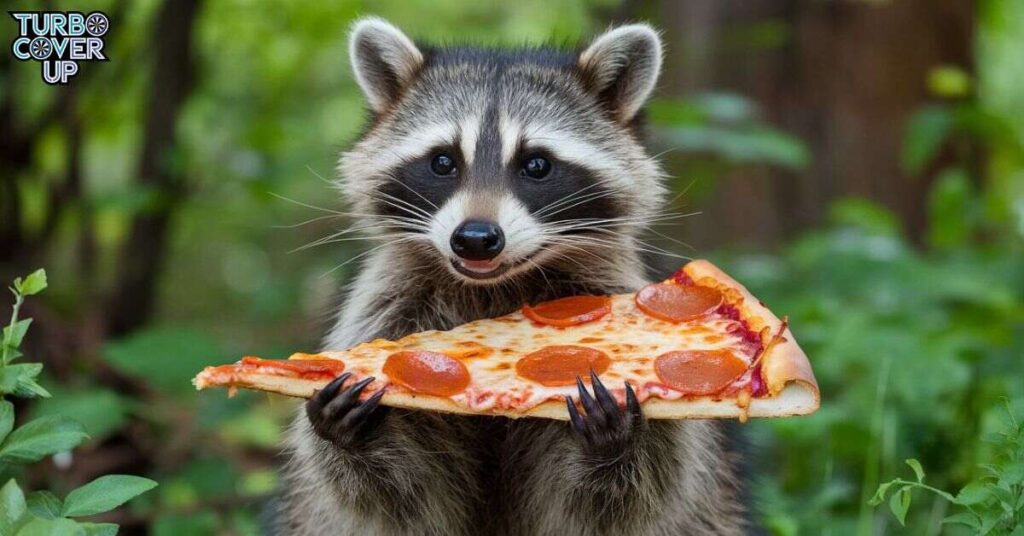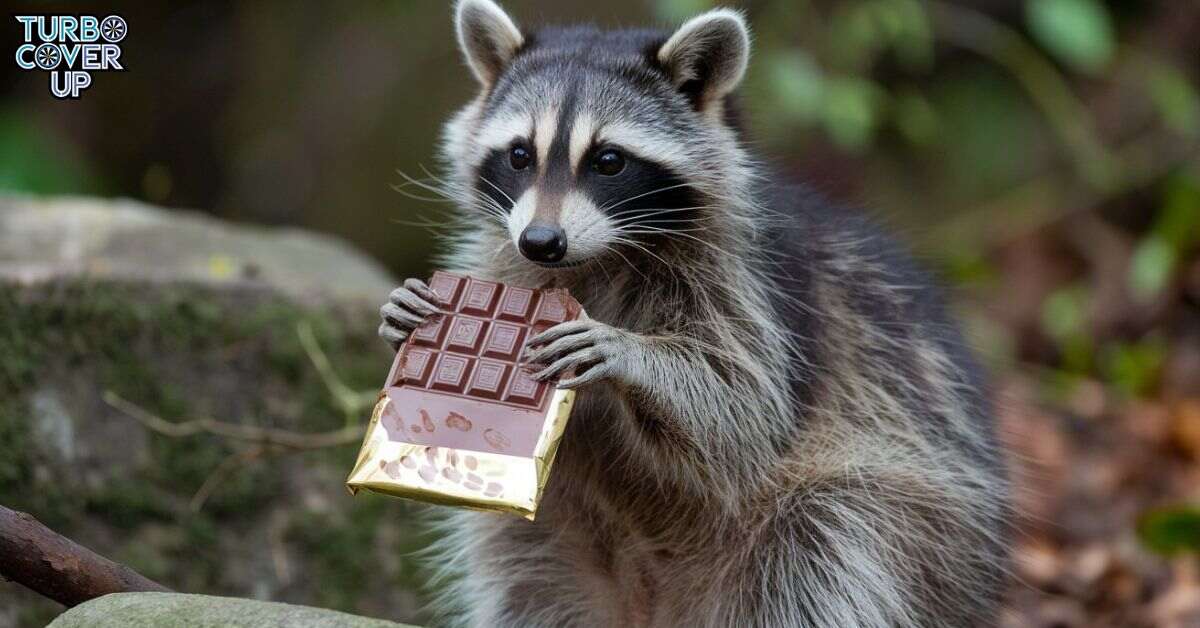Many people enjoy chocolate as a treat, but when it comes to wildlife, it can be dangerous. Raccoons are curious creatures that will eat almost anything they can get their paws on. But just because they can find chocolate doesn’t mean it’s safe for them. You might wonder, can raccoons eat chocolate without harm?
The simple answer is no. Chocolate contains a compound called theobromine, which is toxic to many animals, including raccoons. Even small amounts can make them sick or worse. Let’s explore why chocolate is harmful and what you should do if a raccoon gets into something.
Introduction
Raccoons are clever creatures with a knack for adapting to urban life. They’ve earned the nickname “trash pandas” for good reason – these masked bandits will eat just about anything they can get their paws on.
But while their diet of raccoons is diverse, not everything they find tasty is good for them. Chocolate, in particular, can be a sneaky threat to these opportunistic eaters. Let’s discuss the world of raccoons’ eating habits and uncover why chocolate should stay off their menu.
Raccoons
Raccoons are those mischievous masked marauders that have captured our hearts (and sometimes our garbage cans). Native to North America, these adaptable critters have made themselves right at home in our cities and suburbs.
With their distinctive black “masks” and ringed tails, raccoons look like nature’s own burglars. But don’t let their cute appearance fool you – these guys are smart cookies with a real knack for survival.
Raccoons have taken to urban living like ducks to water. They’ve swapped their natural habitat for the concrete jungle, proving that they’re masters of adaptation. In the wild, raccoons might spend their nights foraging for berries or fishing in streams.
They’re more likely to be seen doing some late-night dumpster diving. This ability to thrive in both wild and urban environments is a testament to their intelligence and flexibility. It’s no wonder these clever creatures have become such a common sight in backyards and alleyways across the USA.
Favorite Food Of The Raccoon

When it comes to chow time, raccoons aren’t picky eaters. In their natural habitat, these omnivorous opportunists have a varied menu that would make any foodie jealous.
They’ll munch on fruits, nuts, and berries one minute, then switch to crayfish, frogs, or small rodents the next. Insects are like nature’s potato chips for raccoons – they just can’t get enough of them. This diverse diet helps raccoons get all the nutrients they need to stay healthy in the wild.
Can You Give Chocolate To A Raccoon?
The short answer is a resounding no! Just like dogs and cats, raccoons can’t process certain compounds found in chocolate, making it toxic for them.
Chocolate contains theobromine and caffeine, two substances that raccoons (and many other animals) can’t metabolize effectively. While we humans can enjoy a chocolate bar without worry, for raccoons, it’s a different story.
Their bodies struggle to break down these compounds, which can lead to serious health issues. So, even if a raccoon gives you those big, pleading eyes, resist the urge to share your chocolate stash. It’s a case where what they don’t know (or eat) won’t hurt them!
What About Raccoons? Do They Like Chocolate?
These little sweet-tooths are naturally drawn to sugary, high-calorie foods. It’s an instinct that serves them well in the wild, where calorie-dense foods provide the energy they need to survive. But in urban areas, this sweet tooth can lead them straight to our candy wrappers and chocolate bars.
Raccoons’ love for sweets is part of their broader omnivorous diet. In the wild, they might satisfy this craving with ripe fruits or honey. But in our cities and suburbs, chocolate becomes an irresistible temptation.
It’s important to remember that just because raccoons like something, doesn’t mean it’s good for them. Their food preferences in urban areas often lead them to nutritionally poor or even dangerous foods. This disconnect between what tastes good and what’s actually healthy is a challenge for urban wildlife like raccoons.
Do Raccoons Get Sick From Eating Chocolate?
When raccoons are involved in chocolate, it’s not just a harmless treat – it can make them seriously ill. The main culprits are theobromine and caffeine, two compounds found in cocoa. While humans can easily metabolize these substances, raccoons process them much more slowly. This means the toxic compounds can build up in their system, leading to chocolate poisoning.
So, what happens when a raccoon eats chocolate? Symptoms can range from mild to severe, depending on how much they’ve eaten. Here’s a quick rundown:
| Symptom | Severity |
| Restlessness | Mild |
| Increased heart rate | Moderate |
| Vomiting | Moderate |
| Diarrhea | Moderate |
| Seizures | Severe |
| Heart problems | Severe |
In severe cases, chocolate poisoning can even be fatal for raccoons. It’s a stark reminder that our favorite treats can be dangerous for wildlife. If you suspect a raccoon has eaten chocolate, it’s best to contact a wildlife rehabilitator for advice.
Things To Avoid Feeding Raccoons
Foods like onions, garlic, and avocados can all cause digestive issues or worse in raccoons. Even seemingly harmless foods like bread can be problematic, as they don’t provide the nutrients raccoons need.
But here’s the thing – feeding wildlife, even with “safe” foods, can cause more harm than good. When raccoons become dependent on human food, they may lose their natural foraging behavior.
This can lead to nutritional imbalances and make it harder for them to survive if human food sources disappear.
Raccoons that associate humans with food may become bolder, leading to more human-wildlife conflicts. Instead of feeding raccoons, the best thing we can do is secure our trash and enjoy watching these clever creatures from a respectful distance.
Is Chocolate Everybody’s Favorite?
Chocolate – it’s been called the food of the gods, and for many of us humans, it certainly feels that way. Our love affair with chocolate dates back thousands of years, to the ancient civilizations of Mesoamerica.
Today, it’s a global obsession, with the average American consuming around 9.5 pounds of chocolate each year. But while we can indulge in this sweet treat without worry, the same can’t be said for many animals.
The reason chocolate affects animals differently comes down to evolution. Humans have developed the ability to metabolize theobromine and caffeine efficiently. But many animals, including raccoons, dogs, and cats, lack this ability.
It’s a quirk of nature – the compounds in chocolate that give us a pleasant buzz can be downright dangerous for our furry friends. This is why it’s so important to keep chocolate and other human treats out of reach of wildlife and pets alike.
Final Thoughts
These clever omnivores might be tempted by the sweet smell of cocoa, chocolate is a dangerous treat for our masked friends. From mild discomfort to serious illness, the risks far outweigh any momentary pleasure a raccoon might get from snacking on our leftover candy bars.
Remember, the best way to appreciate raccoons is from a distance. By keeping our trash secure and avoiding the temptation to feed them, we can help these adaptable creatures maintain their natural foraging behavior and stay healthy.
If you spot a raccoon in your neighborhood, enjoy the sighting, but keep the chocolate to yourself. And if you ever suspect a raccoon has ingested chocolate or any other potentially harmful substance, don’t hesitate to contact a local wildlife rehabilitator.
By being mindful of our actions, we can coexist peacefully with these fascinating urban wildlife neighbors. After all, a healthy raccoon population is something we can all feel sweet about – no chocolate is required!
Whether they’re in the forest, wetlands, or our own backyards, raccoons play an important role in our ecosystem. Let’s do our part to ensure their diet remains natural and healthy, supporting their vital place in our biodiversity.
Frequently Asked Questions
Can raccoons safely eat chocolate?
No, chocolate is toxic to raccoons due to theobromine and caffeine, which can make them very sick.
What happens if a raccoon eats chocolate?
Symptoms include restlessness, vomiting, diarrhea, and in severe cases, seizures or heart problems.
How can I prevent raccoons from eating chocolate?
Secure your trash and avoid leaving food scraps outside to prevent attracting raccoons.
What should I do if I think a raccoon ate chocolate?
Contact a wildlife rehabilitator immediately for advice on how to help the raccoon.
Are there other foods that are harmful to raccoons?
Yes, foods like onions, garlic, and avocados can also be harmful to raccoons.
Read More:

